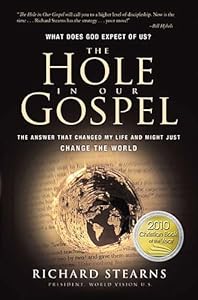Chapter One: a hole in the whole
From the opening lines of chapter one, Richard Stearns sprints out of the starting blocks and races toward the essential message of his book: the Christian faith is concerned with this life as well as the after life. God did not save us so we could passively cash in our eternal life chip when we die, but so we could engage in serving and transforming the world around us. As Stearns aptly stated, Christ’s kingdom “was not intended to be a far-off and distant kingdom to be experienced only in the afterlife,” but rather, the Kingdom of God was intended “to change and challenge everything in our fallen world in the here and now.”[1]
Any Gospel message that only emphasizes eternal security without mentioning earthly responsibility is a hole-ridden Gospel that does disservice to its hearers.
Mr. Stearns reminds us that Jesus expected His followers to engage in both prayer and the practice of good deeds. One action without the other is incomplete. On the one hand Jesus told His followers to pray for God’s Kingdom to come to the earth (Matthew 6:9-10), but on the other hand He also said that we are to be tangible “salt and light” in every corner of our world (Matthew 5:13-16).
Let’s adopt this most biblical of perspectives and read the rest of this book with the understanding that we are both pray-ers and doers, worshippers and workers, spiritual warriors and practical ministers, under a mandate to change this life while we await the next.
Questions for reflection and discussion:
- Are you a stronger pray-er or doer?
- Have you accepted the responsibility to positively contribute to the spread of God’s kingdom in the world around you?
[1] Richard Stearns, The Hole in our Gospel (Thomas Nelson, Nashville, TN: 2009): 17.
